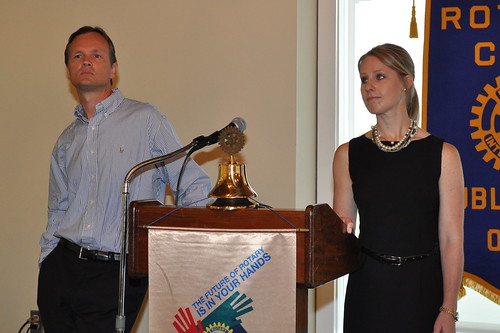Free to Smile

"To quote Duane Elgin, the character of a society is the cumulative result of the countless small actions, day in and day out, of millions of people," began Jennifer Miller, DDS (and daughter of proud Dublin AM Rotarian John Miller), in a message that surely resonates with all Rotarians.
Jennifer's quote, however appropriate for us, turns out to be too modest. She will soon be leaving for Cambodia, in an action that can in no way be described as small, to provide free dental care and cleft-palate surgeries with the group Free to Smile.
Byron Henry is co-founder of the group, which also takes volunteers to Guatemala, Colombia, Cameroon, and Tibet.
"Cleft palate is the 4th most common birth defect," Jennifer explained, affecting 1 in 700 Caucasians and as many as 1 in 400 Asians. Cleft can occur as early as the 5th or 6th week of pregnancy; it can have genetic causes and is also associated with environmental factors, especially a lack of multivitamins. Cleft results when there is not enough tissue in the mouth or lips and the tissues present do not join properly, leaving a split or splits in the lips and the roof of the mouth."
While generally treated at an early age in the US, except in the poorest rural areas, cleft is a "frightening defect in other areas, especially communities without education. " If left untreated, cleft often has "devastating effects, with people not getting enough nutrition and facing ostracism because even their mothers think of them as 'evil'."
Byron explained Free to Smile recruits volunteers and sometimes pay people to go throughout the countryside to let people know the group is visiting. When they arrive, "children are standing in line to get care. The group performs basic dental care, including cleaning and filling cavities; this care is vital, explained Byron, since in these n areas the infection resulting from a single tooth cavity "can cause a major systemic reaction, leading to blindness or even death."
In addition, the group can do some "25 cleft palate surgeries in a week." The choice of who might or might not get the surgery can be a painful one, said Byron:
"Not everyone is a good candidate because of possible reactions to anesthesia or other reasons, but often simply because we can't treat all of the 300 people who might show up in need."
Individual stories and successes make all the work and hard choices worthwhile. Byron discussed a few examples of the huge difference that the surgery can make, including a "47 year old man with a bilateral (two-sided) cleft." When he came for the operation, he was emotionally distant, seemingly even unreachable. He had a farm, but no companions. He had been shunned all his life. He never smiled. I left thinking I had fixed his mouth but not his heart. When the group came back two years later, however, he made a special effort to come see us. He had a huge smile, not one but two wives, and a baby on the way. He was returning to school to get an education. He stayed for some time, talking and laughing; the surgery had allowed him to turn around his life."
Jennifer reiterated this point, concluding the presentation with by saying "life begins at the end of your comfort zone." For her, the "sweet smile that comes to the faces we help makes me know that Free to Smile is something I want to do. Those smiles are more than enough reward for the long hours and the challenges we face."
Jennifer and Byron clearly know about the glory that trained and dedicated people can win, and bring to others, when they go outside their comfort zones. Our Rotary friend John Miller, however, can take great comfort in knowing that he has raised a talented and giving daughter who lives the values that we all joined Rotary to support.